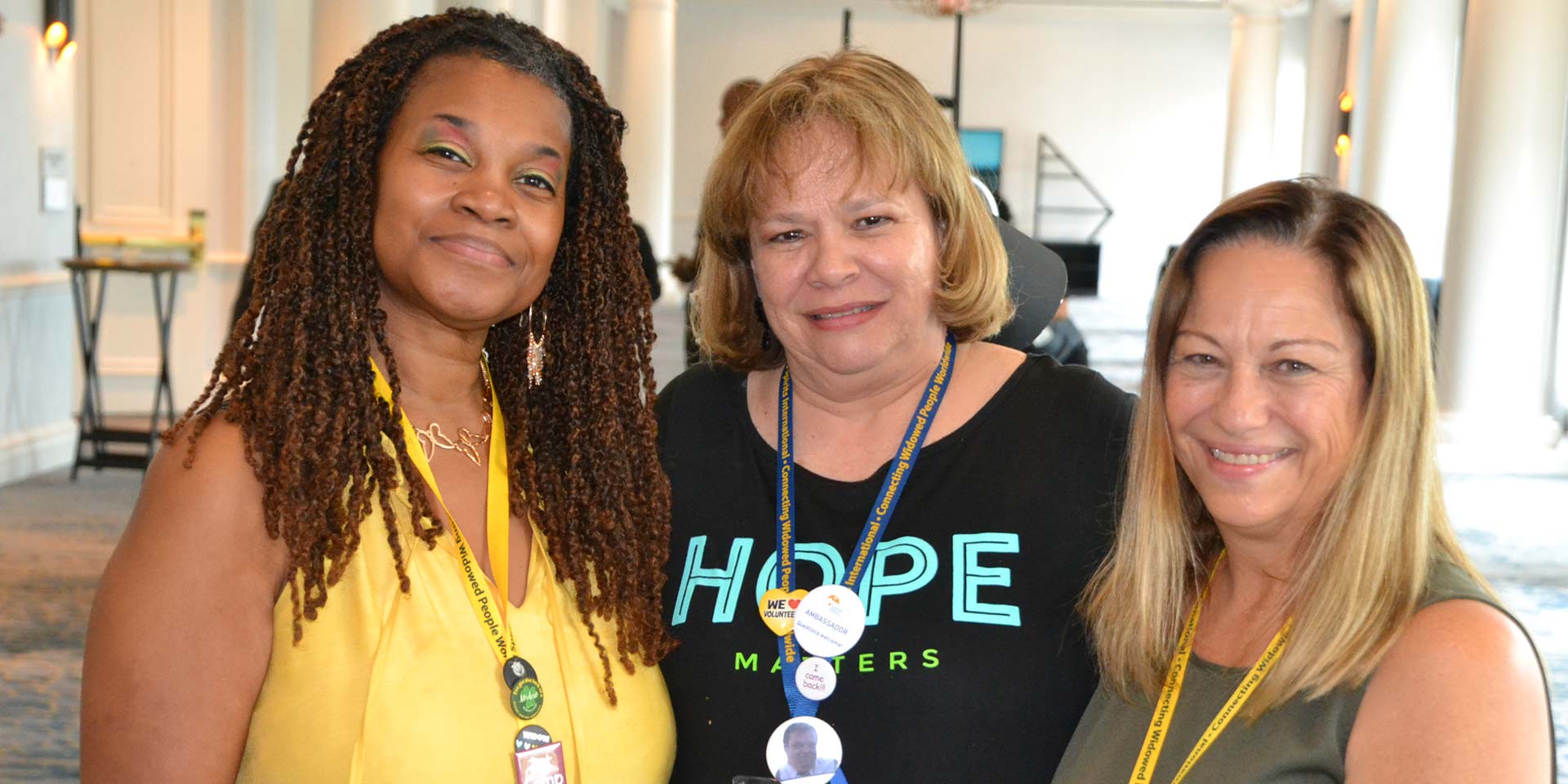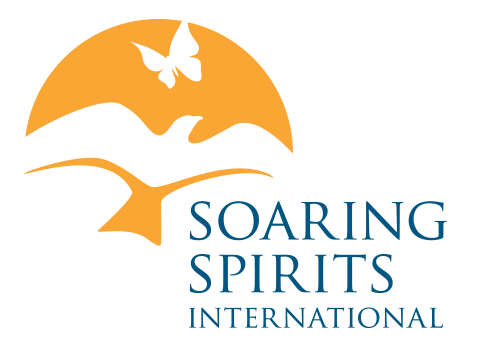
Diversity
Widowhood is a human experience. Soaring Spirits programs are offered for any person who has experienced the death of their person. We employ a broad definition of the word widowed. If the person you planned to spend your life with died, and you consider yourself widowed, so do we. Access to our programs is not limited by marital or relationship status, is not dictated by gender or sexual identity, and it does not require adherence to a specific religious tradition. SSI is committed to making space for the complicated realities of widowhood, and honoring the diversity that grief creates.
How we live out our commitment to diversity:
We work to build a diverse community through intentional use of images, language, and resources that express the diversity of our widowed population. We want all widowed people to feel welcomed into our programs, and to see themselves represented in our program materials and organizational marketing.
Equity
Limitations in access to grief support informs how a person integrates and moves through the death of a partner. The death of a spouse or partner is one of life’s most stressful and painful experiences. How a widowed person navigates this loss is informed by many factors including socioeconomic resources, exposure to violence, access to health care, cultural values, language access, differences in abilities (both visible and invisible), and systemic racism. We acknowledge that access to our programs is not equally available for a diverse variety of underserved populations. We are committed to working to remove barriers to program access systematically, intentionally, and consistently.
How we live out our commitment to equity:
We are working to build a more equitable community by engaging in active outreach to underrepresented populations within our programs. We collect data on demographics including race, gender identity, income, sexual orientation, and parenting status, to better understand who we are serving and look for patterns to identify and address barriers to accessing services.
Inclusion
Death doesn’t discriminate and neither do we. Grief has no income level, age, race, religion, sexual identity, prejudice, or bias. Yet, how people of different cultures and identities mourn can be incredibly diverse. We believe that serving all widowed people is our duty, and our responsibility. We recognize that serving a diverse community well, requires curiosity, cultural humility, and ongoing, intentional effort. We regularly assess the relevance of our programming for the diverse community we serve, by seeking feedback from widowed people who are part of underrepresented communities within our programming. We use that feedback to adapt, improve, and expand our resources to include ever broader and more diverse groups of widowed people.
How we live out our commitment to inclusion:
We work to build a more inclusive community by collecting feedback through surveys, focus groups, and one-on-one interviews. We do this in order to adapt, improve, and expand our resources to include ever broader and more diverse groups of widowed people.
Why We Make Equity and Inclusion a Priority.
As an organization we understand that we do not exist separately from the oppressive systems that perpetuate disparities. These systems support some individuals and communities, and create barriers and harm to others. Soaring Spirits’ work is research driven. Research consistently confirms that communities of color are disproportionately affected by health disparities, including the COVID-19 pandemic, homicide, and gun violence.
While all humans experience grief, all humans do not have equal access to grief support. Every widowed person does not have equal access to acknowledgement of their relationship, or their status as a widowed person. This means that certain communities are more likely to experience isolation, prolonged and complex grief due to lack of support. There is also an increased likelihood of experiencing multiple losses.
Acknowledging and addressing these disparities is a critical part of meeting our duty to provide resources, programs and community for all widowed people. Our commitment to DEI work is ongoing, evolving, and never finished. We consider the statements made here to provide a snapshot of our continued efforts to improve the way we represent our widowed community. We review our statement every six months in order to adapt to our ever changing global community.
We want to recognize the many grief organizations whose public DEI commitments have inspired us to be better, to do better, and to participate in the messy, but vital, work of diversity, equity and inclusion, in support of the grieving people we serve.
Our goal is to continually work toward developing a vibrant, inclusive, and resilient community of staff, volunteers, board members, and widowed people.
We invite you to join us.
Actions we’ve taken in the past twelve months that reflect our commitment to the ongoing work of Diversity, Equity and Inclusion:
- We are actively creating leadership pipelines to foster representation of underserved populations within our global community. For example, we offer LGBTQ+ specific programming including a track at Camp Widow, In addition to ongoing virtual peer support led by and for LGBTQ+ widowed people.
- Recognizing that people who identify as widowers are often underrepresented in grief programming, we developed a focus group to provide a peer community for widowers.
- We have convened a steering committee of Black individuals to drive policy decisions and programming, which has resulted in new initiatives like our Black & Widowed Virtual Group which launched in February of 2023.
- We regularly collect feedback through surveys, focus groups, and one-on-one interviews to adapt, improve, and expand our resources to include ever broader and more diverse groups of widowed people. This feedback collection resulted in adding rainbow colored lanyards to our Camp Widow programs to represent the LGBTQ+ widowed population and foster recognition of our community members who experienced the death of a same gender partner.
- We have adapted the data we collect on demographics to include race, gender identity, income, sexual orientation, and parenting status to better understand who we are serving. This assists us in identifying patterns that will inform future programming.
- Our staff engage in bi-weekly group training that fosters a better understanding of DEI initiatives, and that helps us identify our own biases in order to lead by example, as we work together to create the diverse, inclusive, equitable community we envision.
- We hold our organizational partners accountable by addressing programmatic or technological features of the platforms we use, that limit access for any of our widowed community members, in particular for those with physical conditions that influence how they use technology.
- We offer Friends of Bill meetings at every Camp Widow weekend to support our community members who are in recovery.
- We intentionally and systematically apply a DEI lens to every program we offer, and work to ensure that the presenters we feature in our programs represent as diverse a range of experiences as possible.
- We add closed captioning in three languages for all of our video content.
- We create social media content that addresses grief activating and traumatic events in the news, specifically events that intersect with race, gender, ability, sexuality and other underserved and underrepresented populations
- We actively curate social media content that reflects, acknowledges and honors the diversity of spiritual and religious beliefs represented by our community.
Our Next Areas of Focus
- Expanding our programming to Spanish speakers
- Secure training on cultural humility for staff and board
- Continue building leadership pipeline of LGBTQ+ and BIPOC leaders
- Develop processes that provide equitable access to our virtual programs.
- Review our documents and signage to ensure the use of inclusive language
- Develop captions for social media posts to provide better access for community members with visual impairments
